
- Home
- Crunchtime Blog
- The Restaurant Operator’s Guide to Fair Workweek
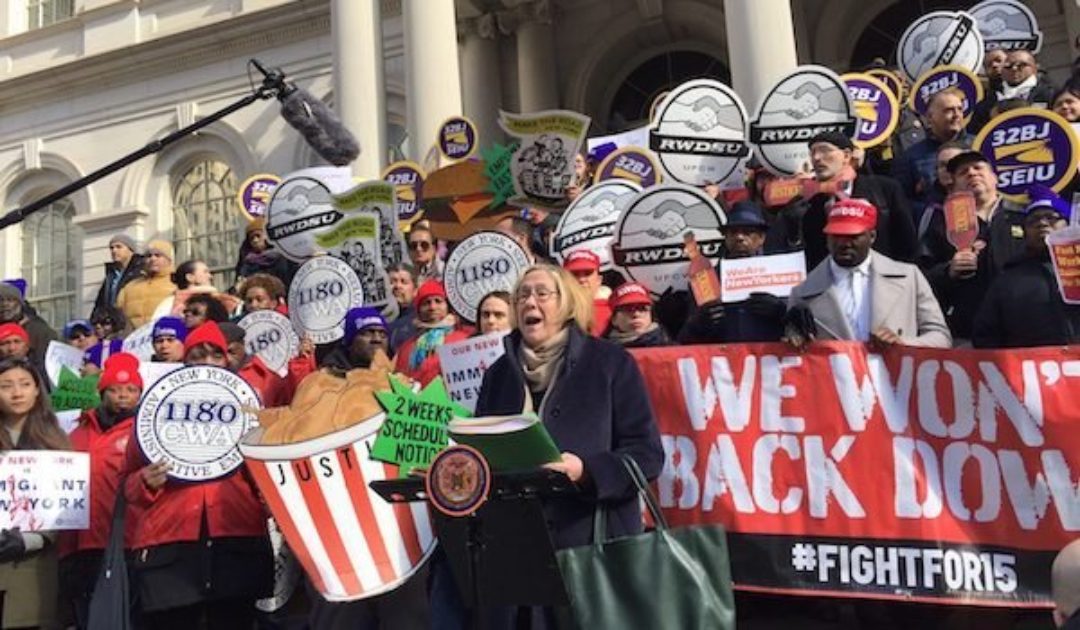
The Restaurant Operator’s Guide to Fair Workweek
Review this guide to ensure your restaurants are compliant with the most common Fair Workweek laws that impact operators.
Skip to:
Part 1 — 8 Common Fair Workweek requirements in the restaurant industry
Part 2 — 10 Features restaurants need in their labor & scheduling platform
About Fair Workweek Laws
Fair Workweek laws, also referred to as “predictive scheduling laws,” are designed to provide employees with more predictable work schedules, in an effort to protect employees from unfair or inconvenient labor practices. The work environment of a restaurant can be fast-paced and unpredictable, and unfortunately, the restaurant industry often finds itself in a negative spotlight when it comes to these law violations.
Businesses that violate Fair Workweek laws can face steep penalties. The New York City Department of Labor and Consumer Protection recently fined restaurants $5 million for violating various scheduling restrictions. And lawmakers aren’t stopping there – the New York City Council has proposed additional legislation that would “suspend, revoke, deny, or refuse to renew a food service establishment permit” if a company has had to pay $500,000 or more over a three-year period for violating the Fair Workweek Law.
Fair Workweek legislation is continuing to expand across the US. Cities like Chicago, Philadelphia, Seattle, and Los Angeles have already enacted Fair Workweek regulations, while more cities are following suit. These laws have presented new challenges for many multi-unit restaurant operators who must maintain compliance.
Which laws apply to my restaurant(s) and employees?
A key part of restaurant management operations is staffing stores and scheduling employees, a complicated process that become even more challenging with new laws to understand and follow. If you operate multiple restaurant locations in different jurisdictions, it is essential to understand which laws apply and who is covered by these laws at each of your store locations.
While regulation can differ from city-to-city and state-to-state, most Fair Workweek laws apply to part-time hourly workers in hospitality, retail, or food service industries, with businesses that have at least 50 employees.
The map below shows which states are already affected by Fair Workweek laws, and which states are considering enacting Fair Workweek legislation. 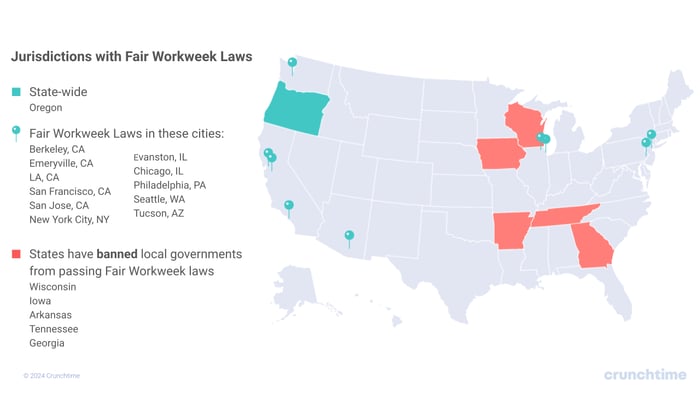
In states like Oregon, the labor ordinances apply state-wide, while other jurisdictions, like New York City, have their own specific laws, like forbidding fast-food workers from being fired unless there is provable just cause, such as a record of chronic lateness or proof that money was taken. On the other hand, states like Georgia and Tennessee, have banned local lawmakers from passing any sort of ordinances around scheduling like Fair Workweek.
You can read more about specific laws for the different jurisdictions here.
Part 1.
These 8 Fair WorkWeek requirements most commonly affect the restaurant industry:
Note: Fair Workweek laws differ from city to city and can change frequently. This article is for general informational purposes and should not be relied on for legal advice. Always consult with a legal expert in the relevant jurisdiction before making decisions.
1. Good Faith Estimate
A good faith estimate is a written estimate of the hours an employee is expected to work. At the time of hire, restaurants should provide this estimate to the employee and it must contain:
-
- The average number of work hours the employee can expect to work each week over a typical 90-day period.
- Clarification on whether the employee can expect to work any on-call shifts.
- A list of days and times (or shifts) that the employee can typically expect to work, or days of the week and times (or shifts) on which the employee will not be scheduled to work—including at least one day off.
- The average number of work hours the employee can expect to work each week over a typical 90-day period.
Employers must provide work schedules and make any necessary changes 14 days before the first shift starts. The specific time frame is called the “minimum notice period” and it varies depending on the jurisdiction. This law is generally intended to give employees enough notice to plan their lives outside of work. If the employer needs to change the schedule, they may have to pay the employee for failing to give enough notice.
The scheduling laws may also outline acceptable methods of providing schedule change notices. This could include written notices, electronic notifications, or posting the changes on a designated bulletin board accessible to employees.
3. Schedule Change Notices
If there are any changes to the posted schedule after it is initially posted, employers must notify employees of these changes within a certain timeframe. If the changes occur after the minimum notice period has passed, the employer may have to compensate the affected employee for the schedule changes. In some jurisdictions, employees can refuse the last minute shift, while other jurisdictions require the employer to pay a premium without the right for an employee to refuse the shift.
4. Premium Pay for Schedule Changes
Some laws require employers to pay additional compensation, often referred to as "predictability pay" or "schedule change premiums," if they make significant changes to the schedule after the initial posting or if employees are asked to work on-call shifts.
For instance, if a restaurant server typically works 30 hours a week, but the manager cancels her shift two days prior because the restaurant is experiencing a slow week, the law may require the employer to pay for half of the hours that the server was originally scheduled, even if they don’t work that number of hours.
This law also applies in the reverse scenario. If a restaurant manager asks a server to work two hours past their originally scheduled shift, the law may require additional compensation.
5. Employee Schedule Requests
Under this law, employees are allowed to openly express their preferences for their work schedules. This means that employees have the right to communicate their preferred days and times to work, or any other scheduling preferences they may have, such as their preferred store location or avoiding specific shifts.
The legislation also prohibits employers from penalizing or retaliating against an employee who expresses their schedule preferences. In other words, employees should not face any adverse consequences, such as reduced hours, demotion, or termination, solely because they shared their scheduling preferences.
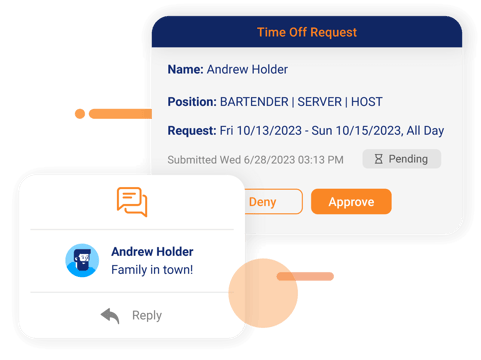
6. “Clopening” and Required Rest
"Clopening" refers to a work practice where an employee is scheduled to work a closing shift and an opening shift consecutively, often with very little time between the two shifts. For example, an employee might finish their closing shift at a late hour (12:00 AM) and then be required to return to work for an opening shift early in the morning (6:00 AM).
The laws around clopening shifts differ between jurisdictions. For instance, some jurisdictions require employers to provide a minimum rest period between consecutive shifts for employees, especially when a shift ends late at night and opens the next morning. The law could stipulate that an employee must have a certain number of hours of rest, such as eight hours, before the start of the next shift.
Other jurisdictions mandate that employers pay employees extra compensation, often referred to as "clopening pay" or "rest period premiums," when they are scheduled for a clopening shift. The additional pay serves as an incentive for employers to avoid scheduling these types of shifts and compensates employees for the inconvenience and potential negative effects on their well-being.
Other jurisdictions require that employers obtain the employee's consent before they are scheduled for a clopening shifts. This gives an employee the opportunity to decline the shift if they prefer not to work such a demanding schedule.
7. Filling Vacant Shifts
In many jurisdictions, employers are required to first offer vacant shifts to existing employees before hiring new employees or using temporary or on-call workers. This requirement is designed to promote stable and predictable work schedules for current employees and to prevent excessive reliance on part-time or temporary workers.
Employers may ask employees if they are willing to voluntarily take on the vacant shift. If an employee agrees to cover the shift, they should be compensated for the additional work hours according to the applicable wage and hour laws.
If an employee voluntarily fills a vacant shift on short notice, the employer may have to pay a “premium pay” or "incentive pay," to the employee. If an employee refuses to fill a vacant shift, Fair Workweek laws generally protect the employee from facing any adverse consequences or retaliation. Employees should be able to exercise their rights to work-life balance without fear of punishment from the employer.
8. Record Keeping & Assumed Guilt
Most Fair Workweek laws require employers to maintain detailed records related to employee schedules, work hours, and other relevant data. This includes clock-in and clock-out times and any modifications made to an employee’s schedule, like shift swaps or changes. If the law requires consent for different scheduling practices, evidence of this consent should also be maintained.
Fair Workweek laws are different from other types of labor laws and lawsuits because the burden of providing proof is always on the employer. This means the employer automatically assumes guilt. If an employer is unable to provide sufficient evidence of compliance with Fair Workweek laws, it may be assumed that they are in violation of the regulations. Accurately documenting all of these records helps ensure transparency and accountability in scheduling practices and is necessary for restaurant operators to address any potential disputes or complaints with employees.
So, how can multi-unit restaurants comply with these different labor laws?
In order to effectively navigate the labor laws explained above, restaurants need a defined strategy in place. Manually tracking scheduling information on spreadsheets or with pen and paper is no longer sufficient for restaurants to maintain compliance, which is why a restaurant operations management system can be helpful.
Restaurants should begin by always maintaining accurate records that reflect their compliance with these laws. The next step is to utilize automation around these scheduling laws. When restaurant managers have automated tools like reminders, scheduling guard rails, and a plethora of detailed reports, they are empowered to make schedules confidently, no matter how complex the jurisdiction's laws might be.
By utilizing the proper scheduling tools, restaurants can position every manager for success and avoid costly labor law infractions. Restaurant scheduling software can also influence how the laws are incorporated into your company policies and create company-wide alignment.
The next section of this blog will provide an overview of the tools and features that restaurants should look for in a labor and scheduling platform in order to maintain compliance with Fair Workweek laws.

Part 2.
Multi-unit restaurants need these 10 features in their labor and scheduling software to maintain compliance:
1. Configurable labor rules for all jurisdictions — Scheduling laws can vary greatly, which adds an additional layer of complexity for multi-unit restaurants. Operators need fully configurable labor rules that can be tweaked and customized at the corporate level for every jurisdiction. In order for a franchised restaurant with multiple locations to comply, all the franchisees should have access to their own labor rule controls.
Correctly configured laws will ensure that the store manager who is responsible for the actual creation of schedules, can work from the parameters of the local law. It also helps automate decisions for store managers and enforces company policies for compliance, like posting schedules two weeks in advance (or whatever duration is required).
2. Dashboard notifications let managers know when to post schedules in advance – Alerts on the dashboard let your managers know when a schedule needs to be created and published to maintain compliance. These alerts, along with other daily task notifications, help keep your managers proactive with all scheduling requirements, no matter which jurisdiction they are located in. 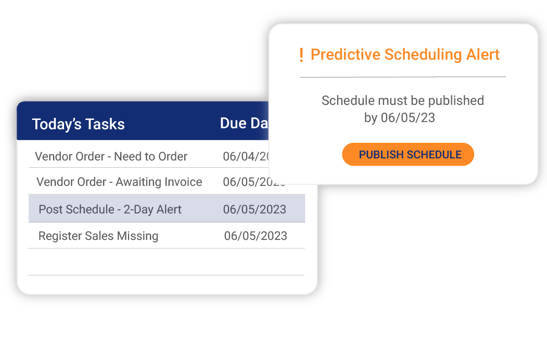
3. Scheduling alerts about potential premium pay – When a manager is creating a schedule or making edits to a scheduled shift within the defined threshold, they will be alerted of any potential premium pay that is required before saving the schedule. This could include pay for clopening shifts or schedule changes. This alerts help avoid any surprises with labor costs at the end of the week.
4. Real-time, actionable alerts during the shift – Managers are alerted when an employee is scheduled to leave with real-time notifications on the dashboard. These customizable widgets are key to proactive management during busy shifts.
5. Ability to compare time clock with scheduled shifts – Managers should be able to quickly compare variances between scheduled shifts and the actual time clock records. Monitoring these variances is the best way to proactively manage labor expenses during shifts and avoid any unexpected costs at the end of a week.
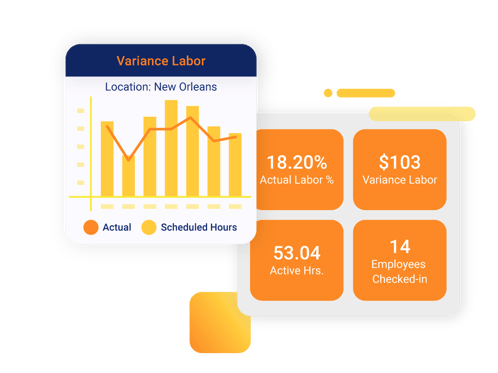
6. Penalty premium notification – It’s also important to set up the scheduling configuration to include penalties and their associated fees. Whenever a decision goes outside the parameters of the local law, a notification is issued. In New York City, a penalty could be as much as $100 for each violation.
7. Premium override acceptance – Conversely, this feature also gives a manager the option to accept the penalty and proceed to schedule an employee for a specific shift, even though it will incur additional costs. 
8. Corporate reports and audits – Both individual restaurant managers and corporate management can run an audit to see all shifts that incurred scheduling change premiums. This visibility of labor costs can help keep expenses in check and indicate what stores may need additional attention. 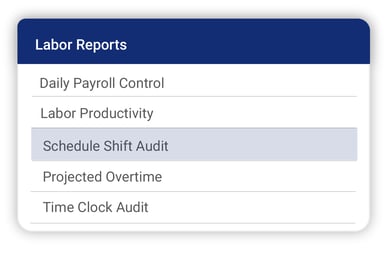
9. Above-store reporting on compliance and violations – Insights at the above-store level reveal which locations are not complying with statutes and how often violations or penalties occur. This is essential to all multi-unit restaurants and franchisors who operate stores across different jurisdictions.
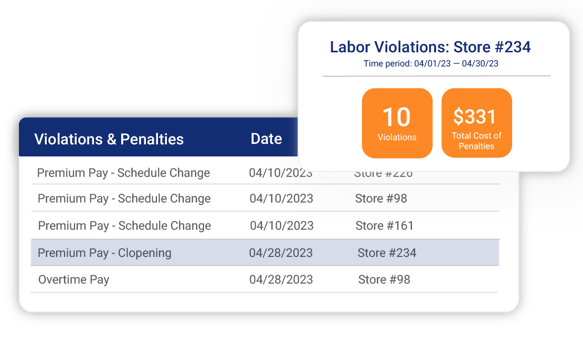
10. Payroll integration – Any accepted premiums should be automatically applied to an employee’s paycheck. This ensures that employees are paid in a timely manner, while also reducing the amount of payroll work required by the manager. Crunchtime integrates with a number of HR and payroll systems to make this process seamless and efficient for our customers.
Conclusion
Labor laws will continue to expand and change in the coming years, and operators should stay prepared. Complying with these continuously-evolving scheduling laws is no simple task, but operators who take a proactive approach to compliance will be well-positioned for growth in the future. With a restaurant operations management solution with integrated restaurant scheduling software, you can monitor and maintain Fair Workweek compliance with ease.
Ready to learn more?
See for yourself how Crunchtime supports Fair Workweek compliance. Schedule a demo today.
Share this post
Related


What if You Could Solve the Restaurant Labor Shortage for $1 Per Hour?


